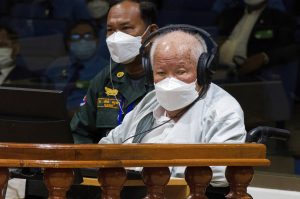A genocide conviction registered against Khieu Samphan, the 91-year-old former Khmer Rouge head of state, was upheld by a full bench of seven judges at the United Nations-backed war crimes tribunal in Phnom Penh on Thursday.
He was convicted of genocide alongside Nuon Chea, also known as “Brother Number 2,” in 2018 by the Extraordinary Chambers in the Courts of Cambodia (ECCC) for his role in the slaughter of Muslim Chams and ethnic Vietnamese, and a raft of other crimes.
Kong Srim, chief judge in the Supreme Court Chamber, said defense lawyers had lodged what they said were 1,824 legal errors challenging the convictions, including further charges of crimes against humanity, made by the Trial Chamber.
That included challenges over the ECCC’s jurisdiction, international law, claims that he did not receive a fair trial, that the prosecution was flawed and marred by a “historical approach” and that there was insufficient evidence to support the convictions.
Kong Srim spent more than two hours reading a litany of abbreviated rulings that ranged from rape – including man-on-man – within marriage to forced disappearances and the “massive” slaughter of Vietnamese and Cham who were to be “exterminated” for political reasons.
With each ruling, the judge said the Trial Chamber had not erred in reaching its verdict, and that Khieu Samphan had failed to substantiate his legal claim, adding “there is nothing new that could support a different finding.”
Khieu Samphan held his composure and looked healthy for his years while seated in a wheelchair and wearing a face mask, as hundreds of Khmer Rouge survivors and their relatives gathered inside and outside the Phnom Penh court to hear the ECCC’s final ruling.
ECCC spokesman Neth Pheaktra said outside the court that the ruling had provided a “historical day for the ECCC, for the Cambodian people and especially for the victims.”
It was the last decision to be made by the ECCC, 16 years after it launched the first prosecutions against Pol Pot’s surviving henchmen, for the deaths of around 2 million people between April 1975 and January 1979.
Khieu Samphan and Nuon Chea were also convicted in 2014 of crimes against humanity in a separate trial, as was Kaing Guek Eav, better known as Duch, who processed 24,000 people for extermination at the S-21 security prison in Phnom Penh.
All three were sentenced to life behind bars by a court that has cost about $350 million and been sharply criticized for political interference by the Cambodian government and an inability to reach a consensus on the prosecution of lower ranking cadre.
Khieu Samphan also appealed for his two life sentences to be served concurrently but Krom Srim said this “was not inappropriate or unfair in any way” and ordered him to be returned to prison.
He launched his appeal in August last year telling the ECCC that he could not accept accusations that he plotted to commit crimes against “my compatriots” including the Muslim Cham and ethnic Vietnamese.
“No matter what you decide I will die in prison. I will die always remembering the suffering of my Cambodian people,” he said.
“I will die seeing death. I am alone in front of you. I am judged symbolically rather than by my actual deed and as an individual. That’s the end.”
His defense also argued in a four-day hearing that the upper court must overturn the Trial Chamber’s verdict of genocide, saying it failed to deliver a written and reasoned verdict on time, which could amount to a violation of the tribunal’s own rules.
But the Supreme Court Chamber of four Cambodian judges and three international judges did not agree and upheld the genocide and other verdicts, which is rare in the international court system.
Jean-Paul Akayesu was found guilty on 15 counts of genocide in September 1998, by the International Criminal Tribunal for Rwanda.
It was the first conviction registered since the U.N. Convention on the Prevention and Punishment of the Crime of Genocide was ratified by General Assembly Resolution in 1948. Since then, six people have been convicted of genocide.
The ECCC is expected to focus on victims and archiving its legal findings before being finally wound up by the end of 2024.

































